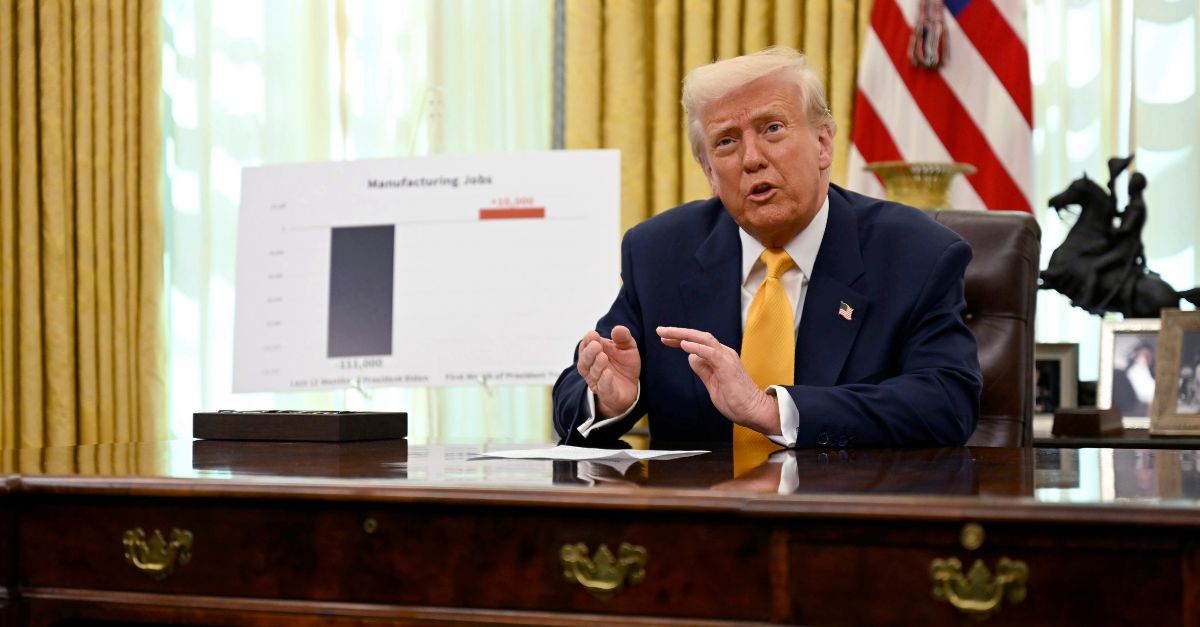Share this @internewscast.com

President Donald Trump delivers remarks in the Oval Office of the White House in Washington, Friday, March 7, 2025. (Pool via AP)
Last month, the Trump administration deported over 100 Venezuelans using an obscure 18th-century wartime power, directly violating federal court orders. Furthermore, the administration’s attempt to use the state secrets privilege to withhold information from the judge, who was questioning whether his orders were followed, relies on claims that the American Civil Liberties Union (ACLU) argues are not even “remotely true” and should be dismissed, according to new court filings by the ACLU.
On Monday, the ACLU urged U.S. District Judge James Boasberg to reject the Trump administration’s assertion of the privilege, arguing it has never been used to block a court’s investigation into its own order’s compliance. If the privilege is allowed, the ACLU claims it would give the administration unchecked power to hide evidence from the courts as it pleases.
“Plaintiffs are unaware of any case where the state secrets privilege has been invoked to withhold evidence from a court aiming to enforce its own orders,” the 20-page filing states. “[T]he use of the state secrets privilege here is completely unjustified. If the government’s reasoning is accepted more widely, it could hinder judicial examination of contempt whenever the government claims a connection to ‘foreign affairs’ or ‘national security’—essentially enabling the executive branch to ignore court orders without consequence.”
The privilege permits the government to withhold certain evidence based on a “reasonable danger” that disclosure would expose military matters in a manner adverse to national security interests — in this case, the administration’s deportation of more than 100 Venezuelan migrants to a notorious prison in El Salvador without due process under the Alien Enemies Act of 1798 (AEA).
“Defendants’ declarations utterly fail to meet their burden to show that disclosure of the ordered information to this Court will endanger national security,” the plaintiffs’ filing states. “Not only are the government’s declarations too vague and speculative to support the application of the state secrets privilege, but their core premises are belied by extensive, official government disclosures concerning the information now claimed to be ‘secrets of state.’ As this Court explained in its March 19 Order, Secretary Rubio ‘has revealed many operational details of the flights, including the number of people involved in the flights, many of their identities, the facility to which they were brought, their manner of treatment, and the time window during which these events occurred.””
The Trump administration, so far, has invoked the AEA to justify mass deportations of members of one particular Venezuelan gang. In the executive order underlying the litigation, Trump called for the removal of “all Venezuelan citizens 14 years of age or older who are members” of Tren de Aragua (TdA), which has been designated as a foreign terrorist organization since January.
On March 15, the ACLU sued for and won a temporary restraining order. Action has since been quick, steady, and tense. An oral bench ruling to stop removals under the auspices of the AEA — which included a directive to turn planes around containing Venezuelan immigrants — was infamously ignored, with the government claiming that the flights had already left U.S. airspace and were therefore outside of the court’s jurisdiction.
The court demanded additional details about the flights and was repeatedly stonewalled with filings that Boasberg described as “intemperate and disrespectful” before the administration invoked the state secrets privilege, asserting that the court did not need any additional information to make a decision.
“No more information is needed to resolve any legal issue in this case,” the DOJ wrote. “Whether the planes carried one TdA terrorist or a thousand or whether the planes made one stop or ten simply has no bearing on any relevant legal issue. The need for additional information here is not merely ‘dubious,’ or ‘trivial,’ it is non-existent. The Executive Branch violated no valid order through its actions, and the Court has all it needs to evaluate compliance. Accordingly, the Court’s factual inquiry should end.”
Boasberg has previously appeared skeptical of the administration’s potential use of the state secrets privilege, noting that the flight information was publicly available and details of the deportation operation had been publicly discussed by multiple high-ranking members of the administration. Trump and Secretary of State Marco Rubio also posted a video to social media revealing a “extensive information” about the logistics of the flights, including the planes, their destinations, and the transfer of prisoner custody.
Ironically, the ACLU concurred with the administration’s claim that the court already has all of the information needed to find whether the government violated the court order, asserting it is obvious that the order was ignored.
“Plaintiffs respectfully submit that the Court already possesses the information it needs to conclude that its March 15 oral and written temporary restraining orders were violated,” the filings states. “The government has confirmed that ‘two flights carrying aliens being removed under the AEA departed U.S. airspace before the Court’s minute order of 7:25 PM EDT, and before the Court’s oral statements during the hearing.’ The government has also confirmed that it is ‘not contest[ing] for the purposes of these proceedings that the planes landed abroad, and that the aliens on board were deplaned, after the issuance of the Court’s minute order.’ These facts, standing alone, establish that the government failed to comply with both of the Court’s orders.”
The two sides will appear before Boasberg on Thursday at 3 p.m. for a hearing on the matter.
Love true crime? Sign up for our newsletter, The Law&Crime Docket, to get the latest real-life crime stories delivered right to your inbox.

















